500 hear 40 discuss educational parenting
“We come together today b’achdut (unity) to show our commitment to our children,” said Rabbi Reuven Taragin in opening a conference on Jewish education that drew more than 500 people to the Young Israel of Woodmere on Sunday.
Billed as the first Five Towns Community Collaborative Conference, the event featured 40 speakers from across the Torah observant spectrum in 40 minute sessions throughout the building. Each speaker presented his or her perspective on honing parenting skills in educating, inspiring and motivating children.
Rabbi Taragin noted differences in hashkafa (philosophy) among participants, but stressed that we have “99 percent in common.”
There was a “palpable excitement in the air, a feeling that it was a special event,” he said, “a strong statement of how primary educating our children is.”
Rabbi Sholom Axelrod, assistant rabbi at YIW, cited questions raised by his father in 1959 about the impact of yeshiva education and the family on the continuity of Jewish traditions, noting that Sunday’s meeting was building “spirituality and continuity.”
Rabbi Taragin’s wife Shani, a Ram for Tanach in Midreshet Lindenbaum in Israel, discussed how the first chapter in Mishlei, Proverbs, describes the steps in a child’s growth and education. She stressed the importance of conveying life and social lessons in the home as well as fostering a Torah learning environment, being a role model, inviting guests, living a life of shalom bayit (positive interactions between the father and mother), not yelling, encouraging children to ask questions, not labeling a child, praising good midot (behavior), serving as a tzniut (modest dress) role model, tolerating irritability but expecting respect, and having kids clean up their messes.
Rabbi Reuven Taragin discussed the unusual conversation between Yosef and Yaakov when Yaakov blessed Menashe and Ephraim, Yosef’s sons born to him in Egypt. He noted that Yaakov stated that the Jews will continue to bless their children using the names of Yosef’s sons, as we do today, because they were the first not brought up in the home of the forefathers and yet chose to connect to tradition. “The only way to get kids to identify with you is if you identify with your past, to something bigger and broader, to be greater but a continuation of our parents.”
“Who will be the Zaidy of our children if not we?” he asked, quoting Moshe Yess.
Rabbi David Fohrman discussed the message of the Shma prayer and the need to educate children in the beauty, levels, layers and patterns in the Torah, to give them the tools to reach into and feel they are a part of the 3,000-year-old document, to love the Torah and thus G-d.
Rabbi Yakov Horowitz, founder and dean of Yeshiva Darchei Noam, Monsey and founder and Director of Project YES, gave practical advice on connecting with one’s children: “Be there, give a couple of minutes, make eye contact, and listen to what the kids say.” He recommended asking a “targeted,” specific question rather than a general one-not “how was your day” but “how was your chem exam” or “did you make up with Aviva?”
He stressed the importance of grandparents as a haven where children can be “spoiled” when parents have to ”blend rachamim and din (mercy and judgment/discipline).
“It’s important for kids to seek guidance when things are wrong around them,” he said. “Listen for the trial balloons. Kids rarely get into trouble without warning.… Listen to them; discuss don’t lecture.” Tell them, “if something is going on in your life, I want to know even if it upsets us. We don’t want you to go through this on your own. We love you,” he said.
Rabbi Horowitz recommended setting boundaries for the use of technology, observing that banning it “never worked.”
He also stressed the importance of child abuse prevention, citing child abuse as the “biggest reason for kids going off the derech (path), drug abuse, suicides. It’s a real issue; it happens everywhere.” He said that having one conversation with some followup makes a child six to seven times more likely not to get into a potential child abuse situation.
Rabbi Herschel Schachter, rosh yeshiva at Rabbi Isaac Elchanan Theological Seminary, Yeshiva University, presented the closing address, outlining the importance of teaching a broad base of Jewish education, including the Tanach (24 books of scriptures), siddur and halacha including halacha l’maseh (practical and applied Jewish law) and pshuto shel mikrah (the text of the Torah).
“We have a lot of work to do,” he said. “It should be with hatzlacha (success).”
The day after the conference, Rabbi Taragin told The Jewish Star that “it succeeded beyond anyone’s expectations or hopes” and organizers may do it again. “The most important educators are the parents, and educators want to help parents be the best educators possible,” he said. “People want to learn how to educate their children.”
Two of the scheduled keynote speakers were unable to attend. Rabbi Yaakov Bender, Rosh Yeshiva at Yeshiva Darchei Torah, was at the bris of his new grandson, and Rabbi Naftali Jaeger, Rosh Yeshiva of Shor Yoshuv, was delayed at a prior commitment, Rabbi Taragin said.






